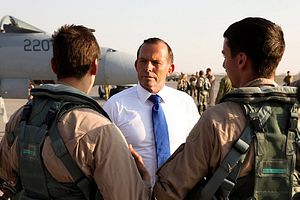Tomorrow’s issue of Der Spiegel features a story on Angela Merkel’s efforts to secure one of the largest arms deals in Germany’s history. The article discusses the, according to a German government source, “outstanding” opportunity for the German arms industry should the German manufacturer ThyssenKrupp Marine Systems (TKMS) be awarded the contract to build up to twelve new submarines for the Australian Royal Navy. TKMS’s offer, the 4,000 tons HDW class 216 is a submarine, specifically designed to meet Canberra’s needs, which is looking to replace its aging Collins-class submarine fleet.
The article further notes that German Chancellor Angela Merkel has already campaigned for the estimated $16 billion weapons deal (other sources cite an indicative price of $20 billion) during the November G-8 meeting in Brisbane, Australia last year, where she met with Australian Prime Minister Tony Abbott. She acknowledged Japan to be Germany’s biggest competitor in winning the contract. Yet, Merkel pointed out that Germany is a neutral arbiter in the Asia-Pacific region, whereas were Australia to choose a Japanese manufacturer, tensions could rise with China. “You are right,” was the terse response of the Australian Prime Minister.
Bloomberg News quotes the defense economics analyst, Mark Thomson, who seems to concur with Angela Merkel’s statement: “Japan hasn’t exported sensitive military technology before and while a deal would mean ties between two close U.S. allies would strengthen, it would be seen in China as a dark cloud.” Yet he also notes that Japan is still the frontrunner in the potential weapons deal. Reuters quotes a former senior Japanese navy commander and his doubts about European manufactures: “I think Japan is the only option for Australia because neither Germany, France nor Sweden has built 4,000-tonne class diesel submarines.”
Japan itself is currently engaged in expanding its submarine force. In 2010, Japan’s Maritime Self-Defense Forces (JMSDF) already announced that they would increase their submarine fleet from 16 to 22 ships. The backbone of the fleet will be ten Soryu-class diesel electric submarines, five of which are already in service, with the rest commissioned by 2019. The Soryus are among the biggest and most technologically advanced diesel submarines in the world. For example, they are capable of traveling under water for up to two weeks without resurfacing.
Australia and Japan are currently discussing a $21 billion weapons deal that would equip the Royal Australian Navy with 12 brand new Soryu-class stealth submarines all outfitted with a new lithium-ion battery propulsion system increasing the range and speed of the vessels.
However, the Australian Journalist, Claire Corbett, outlines some drawbacks to the Japanese option: “The Australian submariner community is highly sceptical, as Japanese subs do not meet Australia’s unique requirements, and their much-touted air-independent propulsion is actually Swedish technology that would have to be bought directly from Sweden. The supposedly silent propulsion system, according to these submariners, also includes a modified French engine that is already out of date. While the upside of a Japanese agreement might include sharing valuable technical data, the Soryu subs are not the easy solution the minister is looking for.” The Diplomat has also reported on some additional difficulties.
So far no decision has been made. Australia continues to rule out an open tender for “Australia’s biggest defense procurement of the century” (the words of South Australian Senator Nick Xenophon) and so far has only confirmed that it received “unsolicited proposals” to build the submarines from Japan, Germany, Sweden and France. This “rushed” process has received stern criticism from some commentators. Der Spiegel thinks that a decision will be reached by the middle of 2015. Other sources state March of this year.

































